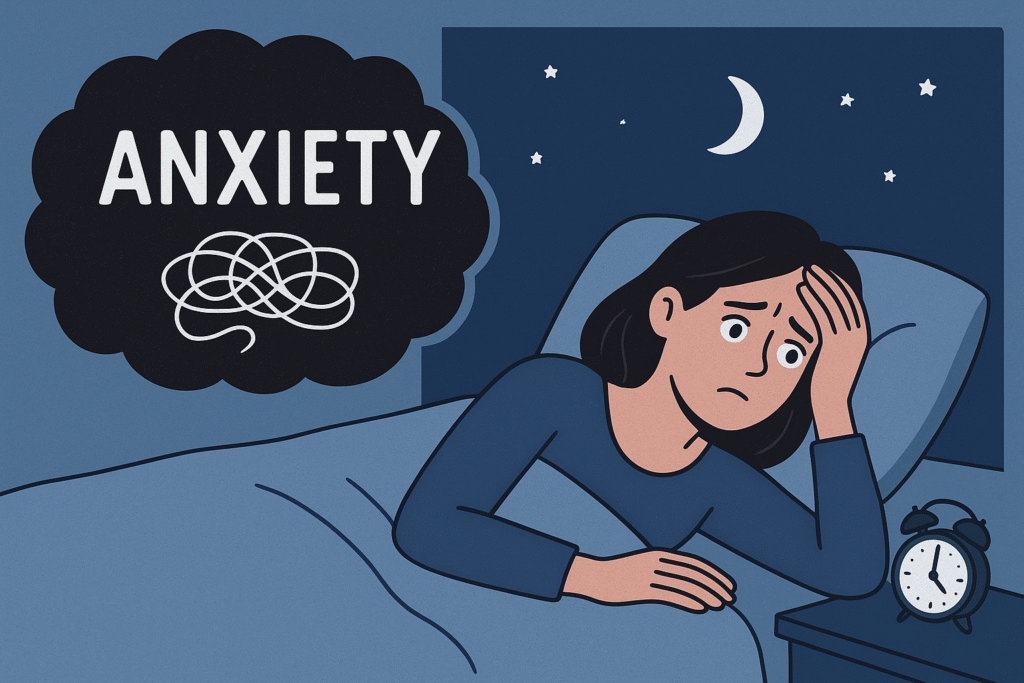The Connection Between Anxiety and Sleepless Nights
Sometimes it feels like unseen threads that bind the restless mind to the tired body. If you have ever started awake at 2a.m. Overthinking and a fast heartbeat—you have felt that silent connection between anxiety and sleepless nights. Anxiety does not end when the day goes; it lingers, whispering fears into the silence meant for dreams.
I know that feeling all too well. For the longest time, I thought I just experienced insomnia, turning and staring at the ceiling, asking the night why rest kept its distance. But it’s was not just sleeplessness; it was anxiety wearing a different face. The day I saw the connection between my stress and my restless night was the day I start to heal.
How Anxiety Disrupts Your Sleep
To understand the connection between anxiety and sleepless nights it’s important to see how anxiety impact the body. When you feel stress, you system activates the stress response releasing stress hormones, but when the alarm never turns off your body forget how to relax making sleep almost.
Even when your eyes close but your mind stay wide awake.
What if I oversleep?
What if tomorrow goes wrong again?
The body lies in bed, but the overthinking is running laps in the dark.
These overthinking keep your brain alert when it should be ready for rest. Your mind mirrors that tension; muscles stay tight, your heartbeat is fast, and even the weakest sound wakes you up. With time, bad habits build an emotional link; your bed becomes a place of tiredness, not recovery.
That painful irony of the connection between anxiety and sleepless nights the more you stress about not sleeping, the harder it is to become rested, and the more tired you feel the next day.
How Anxiety Fuels Insomnia
It’s no surprise that a single restless night can leave you feeling irritable and tense the next day. Your patience thins, your emotions are closed, and your mind sees the world as threats that might not even exist.
Poor sleep fuels anxiety side effects, and anxiety makes sleep harder—a loop that cycles the mind between low energy and worry. Studies suggest that people who live with anxiety are many times more likely to suffer from insomnia. With time, long-term sleep affects the brain’s ability to control emotions, fragility, and stress.
Before long even short challenges start to feel like mountains. You may find yourself emotionally sensitive, low energy, and disconnected—all side effects that tighten the connection between anxiety and sleepless nights
Understanding the Role of Ambien and Xanax in Anxiety and Sleep
When anxiety and sleepless nights move into stressful days, it’s natural to look for relief. For many people turn to medication like Xanax and Ambien for help; both are mainly prescribed for short-term relief. They work in different ways: Ambien targets sleep, and Xanax can calm the stressed mind.
Xanax: A prescription medication that calms the nervous system mainly used to remove panic attacks and generalized anxiety.
Ambien: A prescription medication that is used to fall asleep by reducing the brain by calming it faster.
Both can play a role in the connection between anxiety and sleepless nights, especially when your mind refuses to quiet down naturally. Ever, they should be used with care and under medical guidance. Misuse can lead to dependence, tolerance, or symptoms.
If you are suffering with anxiety-related insomnia, it’s important to talk to your doctor about which option, if any, best suits your needs. Sometimes, the aim is not just to sleep but to treat the anxiety causing the sleeplessness in the first place.
When to Seek Professional Help
If anxiety and sleeplessness are affecting your quality of life, it’s important to reach out for medical care. Long-term insomnia can indicate a hidden anxiety problem or depression.
Doctors may recommend medications like Ambien for short-term sleep relief or Xanax for anxiety control, but these are stages, not final answers. Therapy, lifestyle changes, and emotional support should form the support of recovery.
Noticing the connection between anxiety and sleepless nights early allows for faster healing and prevents long-term mental exhaustion.
Natural Tips to Break the Cycle
Medication like Xanax and Ambien can be used for short-term relief; healing comes from changing habits and mindsets. Here are some tips that helped me and many others shake the connection between anxiety and sleepless nights
Passion Flower tea: This tea helped me sleep sometimes, making it easier to skip Ambien on lighter nights and helping me fall asleep well without overthinking.
Gentle structure and routine: Anxiety rid me of fear of schedules. So I started following a soft routine of a morning walk and writing my thoughts before sleeping, and I do not use my phone after 9 p.m.
Therapy: Cognitive Behavioral Therapy (CBT) teaches practical ways to challenge overthinking thoughts.
The Emotional Impact of Sleepless Nights
Let’s get personal for a moment. There’s a clear kind of alone that comes with staring at the ceiling at 3 a.m., knowing the world is asleep but your mind is not. You replay every conversation, every mistake, every “what if.”
That’s when I understood how true the emotional connection between anxiety and sleepless nights is. Anxiety grows on silence; when there’s no noise or distraction, it has the perfect stage.
With time, I learned that my nighttime anxiety wasn’t random. It was my body’s way of managing unspoken fears and unclear thoughts. The stillness of night increased what I ignored during the day. Handle that helped me change how I approach bedtime.
Why Lifestyle Choices and Self-Kindness
If you are always fight anxiety and weakness, you might start blaming yourself, but remember, your body is just trying to save you. The connection between anxiety and sleepless nights is not a flaw; it’s your system in overdrive, mistaking peace for danger.
Be kind to yourself: Focus on maintaining
Eat a proper meal rich in magnesium and B vitamins.
Daily exercise helps you reduce your stress.
Maintain a regular sleep schedule.
Final Thoughts: Healing the Mind for Restful Nights
The connection between anxiety and sleepless nights move lower than most people realize. It’s not just about sleep; it’s about emotional command, self-acceptance, and learning to calm the mind when it feels unsafe.
Anxiety tells your body to stay alert; sleep asks it to let go. The two cannot live together until you teach your nervous system that peace is safe again. When you take therapy, mindfulness, or temporary support from medications like Ambien or Xanax, remember: the goal it is not just sleep it’s inner stillness.
Every night you choose calm over chaos, you’re teaching your brain a new truth that rest is possible, and you deserve it.

